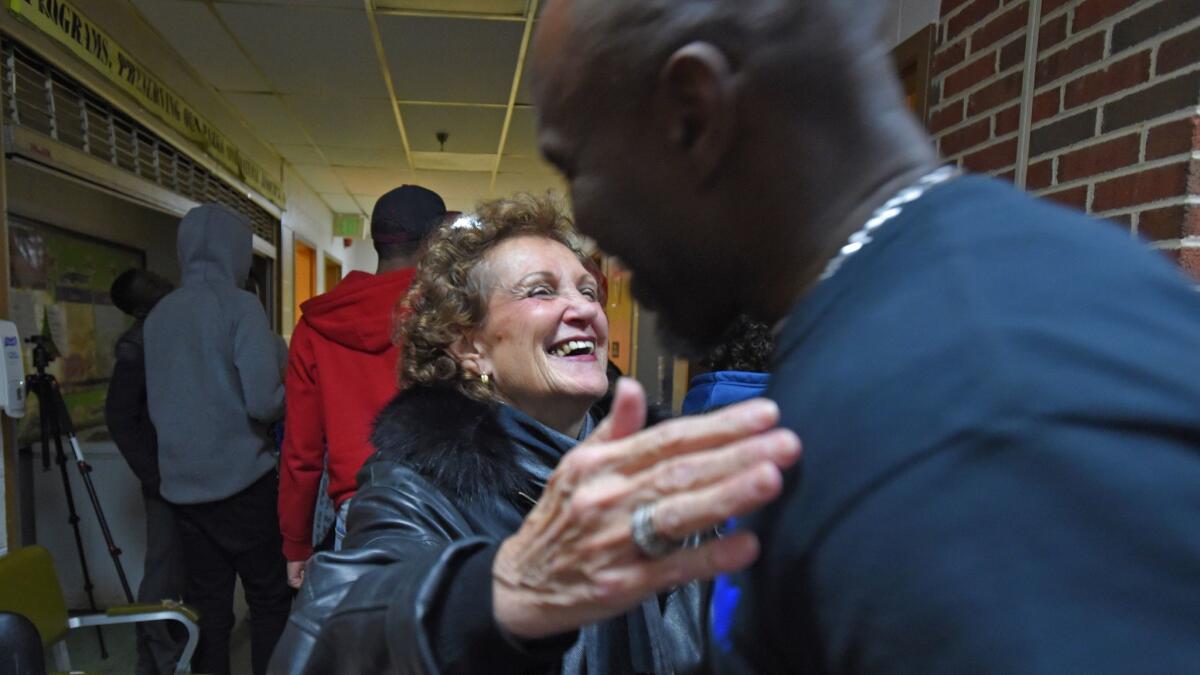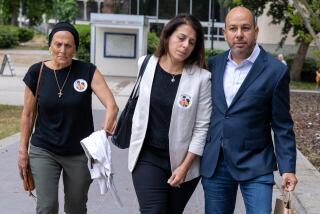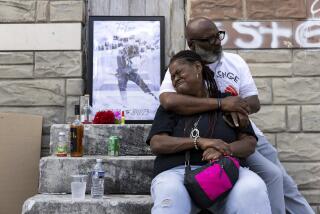Two teens attacked a Baltimore city councilwoman during a carjacking. What happened next surprised everyone

- Share via
Reporting from Baltimore — The weather wasn’t too cold that December morning, so Councilwoman Rochelle “Rikki” Spector put on a light jacket as she headed for her gold Buick.
Two teenage boys from southwest Baltimore were in her Inner Harbor parking garage, cutting school and looking for cars to steal. They fixed their eyes on the 80-year-old Spector. The attack was quick and it was violent.
As Spector got in her vehicle, the 13-year-old blocked her door from closing the door. The 15-year-old hit her in the face, hard.
“I was mad as hell,” Spector recalled recently. “They said, ‘You white bitch, give me your car.’ They punched me in the face. Threw me into a concrete pillar. I was screaming like crazy.”
Word of the attack and the subsequent arrests of the boys made evening newscasts and morning newspapers, and fueled local anxiety. In a city besieged by violence, it seemed to show that no one, not even an octogenarian city official, was safe.
What’s less well known is this: Instead of seeking vengeance, Spector quietly decided to become the boys’ advocate.
She and a team of nonprofit workers, mentors, cooks and coaches, a group Spector has dubbed the “Good Samaritans,” have been working with the boys for months — during and after their time on house arrest — and say their grades, school attendance and attitude have shown marked improvements.
Though the boys are still works in progress, their supporters say, the teens are now emerging as leaders in the neighborhood, trying to teach others to stay out of trouble. Last month, around the anniversary of the December 2016 attack, Spector joined the older teen in front of a large audience at her synagogue, where leaders from across the city presented him with an award for his progress.
The boy who had once punched Spector in the face now shyly tried to hide behind her from the view of the crowd. “He was so overwhelmed, if he didn’t hold on to me, he was going to collapse,” Spector said.
“I felt scared on the inside,” the teenager said. “It was a lot of people and I thought they were going to be ashamed of my actions. But a lot of people started shaking my hand and said they were proud of me.”
A week later, Spector presented another award to the younger boy, who hugged her, called her “ma’am” and said, “I messed up.”
Neither teen is being identified because they were charged as juveniles.
The relationship probably would never have developed if not for UEmpower of Maryland. The nonprofit provides a range of services, including teaching youths how to become cooks.
Shortly after the carjacking, Spector attended a court hearing for the boys. Michelle Suazo, UEmpower’s cofounder and vice president, pulled Spector aside and talked to her about the boys’ situation. Despite the crime, Suazo told Spector, she believed the boys had a lot of promise.
“We invited her to come to the neighborhood and see how much is needed here,” Suazo said.
The median household income in their Carrollton Ridge neighborhood is less than $25,000. Nearly half of families live below the poverty line. Lead paint violations are more than three times the city average, and youths are nearly twice as likely to be murdered as elsewhere in Baltimore. The younger boy lived in a home where the electricity had been shut off, and he seldom attended school.
“We went to court not to say they shouldn’t be punished, but to see if there was some way we could find a solution,” Suazo says. “They need to stay busy. They need to stay engaged. Our goal was to be louder than the streets. If you’re not there every day, the streets just call the kids in at a very early age.”
It would have been easy for Spector to stay angry. She could have asked the judges to jail the teens for years. She said she drew on her Jewish faith and chose to forgive them.
“The Talmud says you first have to have empathy,” she said. “You have to do acts of love and kindness.”
That day in court, Spector — sporting a swollen black eye — approached the older boy and started talking. She told him, “Kids don’t hit grown-ups.” “He burst out crying, and he hugged me,” Spector said. “That was in the courtroom. I knew I was hooked. I was going to be there.”
The boy recalls being overcome with emotion. “We spoke. We hugged,” he recalls. “She gave me a kiss on my cheek. It made me feel happy. I started feeling sad for what we did to her.”
The boys were placed under house arrest. The younger teen spent two months in a juvenile rehabilitation facility in Montgomery County. They are required to continue to report to the Department of Juvenile Services for supervision and drug testing.
Suazo wanted to make sure they were engaged in positive activities during their house arrest. She intervened with the courts to make sure they could attend catering and cooking jobs with UEmpower. She lined up a tutor for the younger boy, who was no longer enrolled in school.
At one event, the teens made food for Spector. “I didn’t think she was going to take it,” the older boy said. “When she tasted it, I felt good in myself.”
All the while, he said, he was trying to do better.
“After this incident happened, and they put me on house arrest,” he said, “I just started busting my school work out. My grades started going up and up and up. I don’t hang around the people I was doing that dumb stuff with. I hang around with whole new people who don’t even live on this side of town. So my life, it just turned around.”
UEmpower has helped organize a team of workers who are bringing services — including food and mentoring — to southwest Baltimore. Spector helped the organization get access to the Samuel F.B. Morse Recreation Center, which now serves as a hub for its services. She regularly attends the group’s functions.
The mother of the older boy in the carjacking says she’s noticed a large improvement. “He’s more focused on what he wants to do in life. He’s trying to finish school and he’s trying to be a role model for kids in the neighborhood, but also his little brothers,” Lakeisha Jones said. “He helps more around the house. I’ve seen a whole 360 on him. He was rebelling, but he came back.”
Mayor Catherine Pugh was at the synagogue to present the award to the boys. “Rikki has been very benevolent, very caring,” she said. “Taking these young men under her arms and mentoring them to a better lifestyle. Their families are grateful. I know they are. I think they are feeling they’ve had a second chance, and that’s what she’s given them.”
The older boy says he’s most attracted to the cooking skills he’s learning from UEmpower. He said he believes it’s a way for kids in the neighborhood to stay busy. “It will get younger and older kids out of trouble. It will keep us away from the streets. And it will keep us from doing bad stuff in the streets. Instead of us being outside, we’ll be in here,” he said.
He said the most important lesson he learned is to be careful about the people he surrounds himself with. “I’m trying to teach [younger kids] not to hang around people they know are going to do bad stuff and to choose the right people to hang around. When it’s time to leave and when it’s time to stay.”
When he attacked Spector, he said, “I wasn’t thinking. I was trying to be a cool kid and do the stuff they do. And not thinking about my actions.”
He sees a future for himself — maybe as a pro athlete (he’s known for a strong throwing arm in football) — or as a veterinarian. He collects fish, turtles, iguanas, snakes and bearded dragons. Spector, he said, “gave me a chance.”
Suazo says Spector has become an important advocate for the boys. “She’s tiny but she’s powerful,” she said. “She has so much energy. Now the boys have a huge advocate in their corner with Rikki. She wants to see them succeed as much as we all do.”
Spector says she’s dedicating the rest of her life to reforming the juvenile justice system. “They’re our children,” she said. “They walk where we walk. If they’re going to do bad, they’re going to be doing bad where we are. I’m going to spend my next 40 years fixing the juvenile justice system.”
Broadwater writes for the Baltimore Sun.
More to Read
Sign up for Essential California
The most important California stories and recommendations in your inbox every morning.
You may occasionally receive promotional content from the Los Angeles Times.











